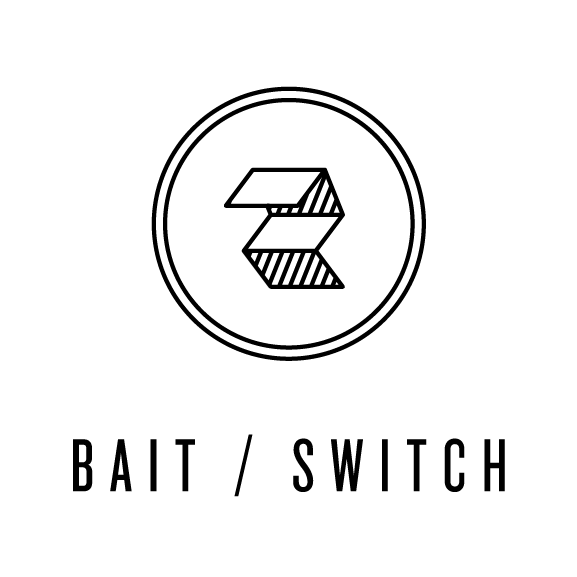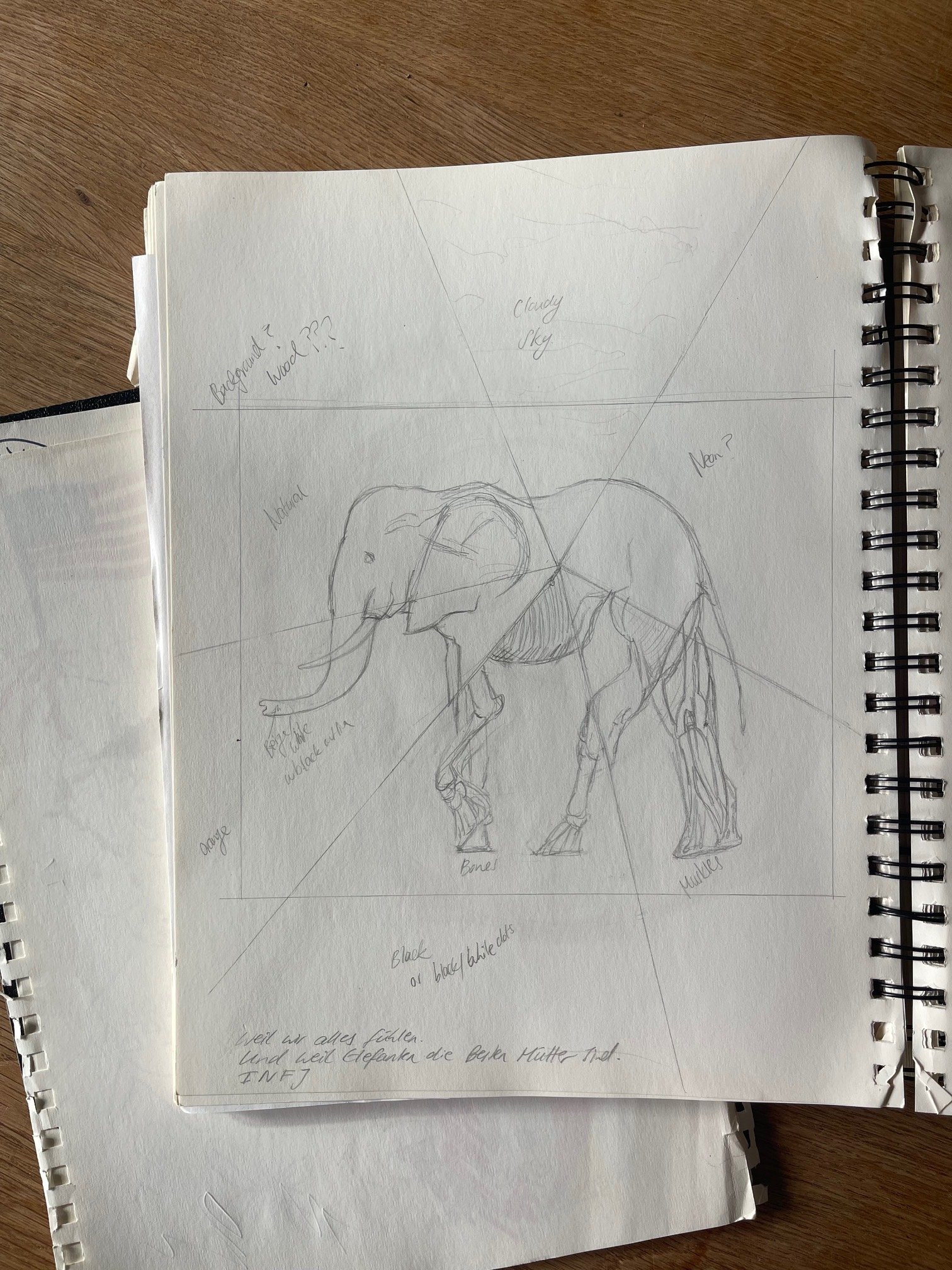Elephant In the Room
Pia Dugger
Elephant In The Room, Acrylic on canvas, 20 x 20 inches
“We stand in the center to be dissected, everyone wants to put us in different categories, and wants to judge us on things we’re not doing right.”
Interview by L. Valena
February 29, 2024
Can you start by describing the prompt that you responded to?
It looked like an image out of a comic book. There were different little sections of images, and it felt like war. Someone was telling a story about war, and maybe AI. It wasn't really a feel-good image, it felt very violent to me. I wondered what I could take from it. At a second glance, what spoke to me were the images of the elephants that were in there. There were some comic book elephants, and some skeletons a little bit lower on the page. I'm enamored with anatomy and osteology, so that stood out.
What were your first thoughts? What direction did you decide to go in?
In the end, I'm really thankful for the prompt, because it instilled in me courage to move forward with an idea that had been floating in my head previously. I'm not a sketcher, so it's very odd that I've had this idea sketched out of this dissected elephant.
The prompt reminded me that this idea was still out there, and seemed like it was telling me that I could do this. I'm an overthinker with my work, and I like to go in and correct and make sure everything is perfect, so it takes time. I decided that this was a sign, because I knew I wasn't going to come up with anything that would fit any better to this prompt, and I have to execute it. Because of the deadline, it might not be executed to the level I would want it to be, but it will be done and out there, and that was very important to me. I'm grateful to the prompt, which initially seemed like it was going to be a huge challenge.
That's so cool. I love that you had this idea floating, and you needed something to come along and give you permission.
It was definitely the push that I needed.
And it was an elephant from the beginning?
It was an elephant from the beginning, and it was a dissected elephant with sections. I knew one section had to be the skeleton, one had to be the muscle structure. One had to be a more realistic version of the elephant, and then I was kind of lost. I knew I couldn't overthink it, I just had to knock it out.
What is it about elephants?
The connection that I have with elephants is that they're good mothers. This piece is actually about motherhood. They are very gentle beings, but they can be fierce if they feel that their young are in danger. In my piece, I was thinking about mothers in today's society. I'm a mother, I have two boys. Sometimes I feel like the mother is the elephant in the room. So much is put on mothers nowadays. There's not usually a choice between staying home or going to work, because financially it's such a challenge. A lot of mothers suffer from high stress and burnout, and it's just not talked about. We're the elephant in the room. We stand in the center to be dissected; everyone wants to put us in different categories and to judge us on things we're not doing right. Nobody is there to solve the whole scenario, because maybe it's too complicated to address properly.
Do you want to talk more about your own experience as a mother?
I worked in the corporate world for most of my life, more specifically in property management. It's not a nine-to-five industry, so you're always on call. It's high-demand. You're dealing with a lot of personalities. I became a mother for the first time in 2010, which was unplanned, but I'm really glad it happened. I had just received a promotion to run my own property, a big high-rise building, and one of the board members had raised concerns. She said, "Pia is a young girl. What do we do when she gets pregnant?" It was such a silly comment, but that's the kind of people I was surrounded by. And as destiny would have it, I got pregnant just a few months into taking that position. I laugh at it now.
I kept working. I had to put my oldest son in daycare when he was only nine weeks old, which still sits with me. It wasn't a good feeling. I became a mother again almost five years later. I had miscarried in between, but there was no comfort when that happened -- it was just suck it up and power through. The circumstances during my second pregnancy were better. Life wasn't so crazy, but I still ended up suffering from postpartum depression the second time around. I kept climbing the career ladder and took a promotion when my second son was six months old, and it was the job from hell. There was no break, always go go go. A lot of guilt when the kids were sick.
There just isn't enough support, and even when you make it through, the emotional scars are still there and continue to be with you. The silver lining to this story is that after I suffered from burnout, I learned to be more gentle with my family. I went back to work after about four months of a mental health break, and found myself in that same cycle. But my husband ended up getting a new job, and now I'm able to stay home and do art full time. I am immensely grateful for that, I know it's not the norm. I know there are so many people out there who struggle with that balance every day.
It's a very strange thing in our culture, that so much has changed, but there's a lot that needs to catch up. I was struck by what you were saying about the emotional scars. It reminded me a lot of that idea of the elephant that never forgets. We go through so many things as human beings, and those experiences never really leave us. Can you tell me about your process?
My process is very straightforward. I'm a painter, but generally not a sketcher. My ideas manifest in my head. When I'm driving, or doing something, I'm always thinking: how does this piece look? First, how does it feel, and then, how does it look? I usually have everything planned, with where all of the colors are going to go. I often make a digital collage of pictures that I find, and then paint it. With this painting, I had my sketch, so I decided to just start. I researched online about elephant anatomy. I had to make up some stuff, because you never find exactly the pieces that you're looking for. If someone with knowledge about elephant anatomy sees this, they might scratch their head.
Well, this isn't for a science textbook, so I think we're okay.
No, those are the sorts of things that would have usually caught me up. I'm an overthinker, and it has to be perfect. I had some areas that I wasn't sure what to do with, and had an artist friend look at it. She said, "you do glitch images!" And I thought, "Of course I do!" As far as the painting process goes, I sketch it out in pencil and spray everything with a workable fixative. Then I prime my canvas in a light pink, because I like what it does with the colors that go on top. Then I go section by section. This piece is painted in acrylics. The canvas is about an inch and a half thick, and I always go around the corners. I don't have unfinished edges, that's just one of my pet peeves.
I'm grateful for the opportunity to put this piece out there. This is a very emotional piece, as is most of my work. It has to have a meaning, and a story that's very meaningful to me. I just want the work to spark conversation.
Do you have any advice for another artist approaching this for the first time?
Take off the pressure! Take the experience for what it is: a creative game/experiment. Don't take yourself too seriously and don't get caught up with perfection. Look at your prompt, let it settle for a bit (maybe even a day or two), and then just play. Enjoy the creative journey it takes you on.
Call Number: R92VA | R94VA.duEle
Pia Dugger is a painter who lives and works in Boynton Beach Florida. Painting in oils and acrylics she creates intellectual art in bright colors including glitch and pixel imagery contrasting with natural specimens, osteology and anatomy. Pia’s work highlights the ongoing struggle of natural beings in a technology- and profit-driven world.






